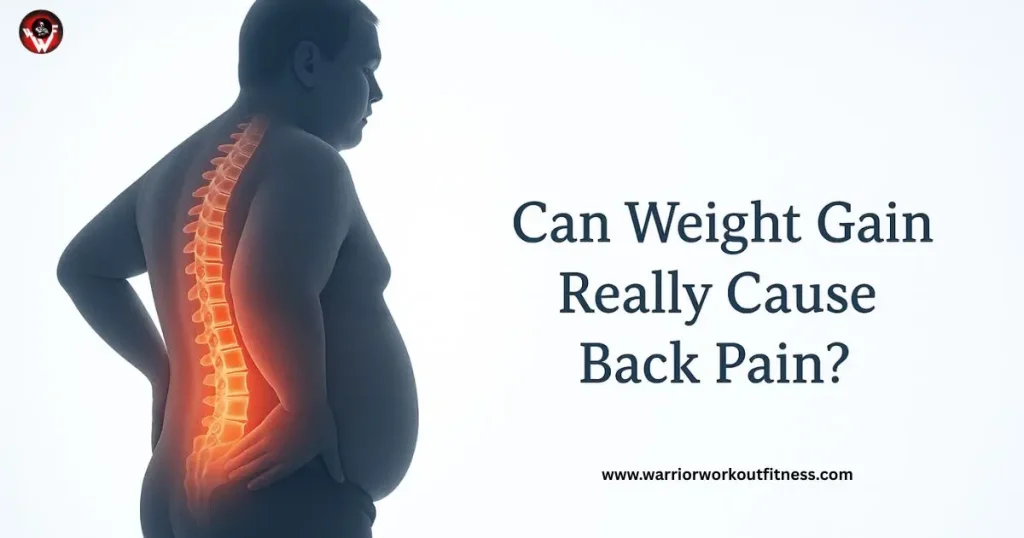Back pain is one of the most common health complaints worldwide, affecting people of all ages and lifestyles. At the same time, weight gain has become increasingly common due to sedentary habits, stress, hormonal changes, and dietary patterns. Many people now find themselves asking the same crucial question: Can weight gain really cause back pain? Or is the connection merely a coincidence?
Experts confirm that weight gain & back pain are strongly linked in many cases. While not every instance of back pain is caused by added body weight, being overweight or gaining excess fat can significantly increase the risk of developing both upper and lower back discomfort. Understanding why this happens, how it affects men and women differently, and what you can do to reduce your pain is essential for maintaining long-term spinal health.
This comprehensive guide explains the science behind weight-related back pain, covers common concerns like belly fat pressure, sleeping discomfort, unexplained weight gain with pain, and even serious questions such as cancer fears. You will also learn practical, evidence-based methods for how to relieve lower back pain from being overweight, all explained in a clear, user-friendly way.
Understanding the Connection Between Weight Gain & Back Pain
The human spine is designed to support a specific range of body weight. When you gain extra pounds—especially rapidly or over a long period—the natural mechanics of the spine are disturbed. The core muscles and spinal joints must work harder to stabilize the body, often leading to structural strain over time.
Fat accumulation changes posture by pulling the spine forward, especially in the abdomen area. This creates increased pressure on the lumbar spine (lower back), causing compression in spinal discs, muscle fatigue, and joint misalignment. The result is chronic stiffness, soreness, and episodes of sharp pain that worsen during standing, walking, or lying down.
Weight gain can also worsen inflammation throughout the body. Excess fat tissue releases inflammatory chemicals that can irritate nerves and joints, contributing to pain perception even without structural damage. This inflammation explains why some people experience back pain shortly after gaining weight rather than years later when severe structural changes develop.
When experts talk about weight gain & back pain, they emphasize both mechanical stress and biological responses. These two combined factors increase the risk of herniated discs, spinal arthritis, nerve compression, and muscle weakness, especially if physical activity remains low.
Does Belly Fat Cause Back Pain?
One of the biggest causes of discomfort related to weight gain is abdominal fat. Belly fat shifts your center of gravity forward, forcing the lower back to arch more than normal. This condition is called anterior pelvic tilt, and it places constant stress on spinal joints and surrounding muscles.
As belly fat increases, core muscle strength often decreases. Weak core muscles make it harder for the body to stabilize the spine, so the lower back must compensate. Over time, muscle fatigue gives way to chronic aching pain or sudden spasms.
Another factor is breathing mechanics. Excess abdominal fat restricts diaphragmatic movement, limiting oxygen intake and creating poor muscle endurance. Fatigued muscles shorten more easily, pulling on spinal structures and intensifying discomfort.
Experts agree that belly fat is among the most influential contributors to lower spinal strain. Weight loss—especially targeted reduction around the abdomen—often brings measurable improvement in posture and pain relief within months.
Can Weight Gain Cause Lower Back Pain?
Among all forms of spinal discomfort, lower back pain is the most strongly associated with excess weight. The lumbar region supports most of the body’s weight, so even modest increases significantly raise the compressive load on spinal discs. For every extra pound gained, the lumbar spine experiences several pounds of added pressure with movement.
This overload leads to early disc degeneration, micro-tears in spinal ligaments, and nerve root irritation. Over time, daily activities such as sitting, lifting, or even standing become painful. Most people are surprised to learn that can weight gain cause lower back pain is not only answered with a clear “yes,” but also that obesity triples the risk of developing chronic lumbar pain.
People who gain weight suddenly may experience back discomfort sooner due to rapid changes in posture before muscles can adapt. Meanwhile, gradual weight increases cause slow structural degeneration that builds pain over months or years.
Can Weight Gain Cause Upper Back Pain?
While lower back pain is more common, can weight gain cause upper back pain is another frequent question. The answer is yes—although through slightly different mechanisms.
Increased chest and abdominal weight often alters shoulder position, encouraging forward rounding of the upper spine. Poor posture due to prolonged sitting and excess body weight compounds the stress, causing tightness in the neck, upper shoulders, and thoracic spine.
In women, breast weight combined with overall fat gain places strain on the upper back, causing muscular fatigue and nerve irritation. This discomfort is often described as burning or tight pain between the shoulder blades.
Weak postural muscles fail to support the spine effectively, leading to tension headaches, shoulder stiffness, and chronic thoracic back pain. Correcting posture through strengthening exercises, weight management, and ergonomic adjustments significantly reduces symptoms.
Female Lower Back Pain and Weight Gain
Women frequently report a unique pattern of discomfort related to weight changes. Female lower back pain and weight gain connections often involve hormonal fluctuations, fat distribution, pregnancy history, and pelvic alignment issues.
Women store more fat in the hips, lower abdomen, and thighs—areas that alter pelvic tilt and lumbar curvature. After pregnancy, weakened abdominal and pelvic floor muscles may fail to stabilize the spine properly. When new weight gain occurs, the lower back becomes particularly vulnerable to overload.
Hormonal changes during perimenopause or menopause also decrease muscle tone and bone density, increasing susceptibility to spinal stress fractures or joint irritation. Combined with reduced physical activity, even moderate weight gain leads to compounded discomfort.
Back pain in women may intensify during menstrual cycles due to fluid retention and pressure on spinal tissues. While the symptoms might fluctuate, their underlying cause is often related to body weight and muscle imbalance.
Unexplained Weight Gain and Lower Back Pain
In some cases, people experience unexplained weight gain and lower back pain without obvious lifestyle changes. This may signal underlying medical issues such as thyroid disorders, hormonal imbalances, depression, fluid retention conditions, or side effects of medications.
Poor sleep caused by back pain can also disrupt metabolism, triggering further weight gain—a vicious cycle that worsens discomfort. Inflammatory conditions may create widespread pain alongside metabolic dysfunction.
Persistent unexplained symptoms deserve medical attention. A physician may investigate endocrine disorders, vitamin deficiencies, or inflammatory illnesses that link sudden weight increases with chronic spinal pain.
Can Weight Gain Cause Back Pain While Sleeping?
Many sufferers wonder: can weight gain cause back pain while sleeping? This nighttime discomfort is extremely common. Increased body weight places constant pressure on the spine when lying down, especially if the mattress lacks proper support.
Extra weight also causes misalignment during side sleeping as hips sink into soft mattresses. In back sleepers, abdominal mass deepens lumbar arching, increasing compressive forces on spinal discs overnight.
Poor sleep posture combined with pressure-sensitive joints leads to stiffness and pain upon waking—often worse than daytime discomfort. This problem improves with adequate mattress firmness, pillow positioning, side-sleeping adjustments, and weight reduction strategies.
Weight Gain & Back Pain: How Muscle Loss Makes It Worse
Weight gain often happens alongside loss of muscle mass, especially when physical activity declines. Weak muscles cannot protect spinal joints effectively, resulting in greater instability and pain. The back depends heavily on supporting muscle groups including the abdominals, glutes, and spinal extensors.
When fat replaces muscle, movements become less efficient. The spine absorbs more shock because muscle damping capacity drops. Over time, this increases micro-injuries to soft tissues and accelerates joint wear.
Strength training is therefore critical—it reduces pain even before major weight loss occurs by restoring stability and improving posture.
How to Relieve Lower Back Pain From Being Fat
Learning how to relieve lower back pain from being overweight requires a combined strategy focusing on movement, posture, weight management, and lifestyle modifications.
First, gentle exercise is essential. Walking, swimming, or cycling strengthens muscles without overloading joints. Core stabilization exercises, including stretches for hip flexors and hamstrings, restore spinal balance. Strengthening the glutes and abdominal muscles supports posture and reduces lumbar pressure.
Second, improving posture makes a dramatic difference. Ergonomic chairs, lumbar cushions, standing desks, and regular posture checks reduce daily strain from sitting.
Third, gradual weight reduction decreases spinal load directly. Even losing 5–10% of total body weight measurably reduces disc pressure and pain levels. Fad diets should be avoided; sustainable lifestyle plans focusing on nutrition, hydration, and sleep provide more lasting results.
Fourth, sleep adjustments matter. Use a medium-firm mattress and maintain neutral spine alignment with supportive pillows. Side sleepers should place a pillow between knees to reduce pelvic torque.
Finally, therapies such as physical therapy, massage, heat therapy, and low-impact yoga help relieve muscle tension and improve flexibility. Short anti-inflammatory treatments may be used under doctor supervision when pain flares.
Lifestyle Factors That Worsen Weight Gain & Back Pain
Sedentary routines amplify pain. Prolonged sitting shortens hip flexors and tightens hamstrings—two muscle groups that heavily influence lumbar mechanics. Poor footwear lacking arch support also alters gait, transmiting shock upward into the spine.
Psychological stress contributes to both weight gain and pain perception. Stress eating increases weight, while emotional tension tightens muscles, especially in the back and shoulders.
Sleep deprivation disrupts appetite hormones, increasing fat accumulation while decreasing pain tolerance. Breaking this cycle through sleep hygiene techniques can significantly improve both weight management and pain outcomes.
Weight Loss Back Pain Cancer: When to Be Concerned
A particularly frightening association people encounter online is weight loss back pain cancer. Unintentional weight loss combined with persistent back pain can in rare cases signal serious medical conditions including cancer.
However, most back pain combined with weight changes is benign and mechanical in origin. The red flags that need urgent medical evaluation include:
- Sudden unexplained weight loss
- Persistent night pain unaffected by position changes
- Neurological symptoms such as numbness or weakness
- Fever or unexplained fatigue
- Pain that becomes progressively severe
If these symptoms occur together, consulting a doctor promptly is crucial. Early detection ensures effective treatment and peace of mind. Yet, it is important to remember that the vast majority of cases involving weight gain & back pain do not indicate cancer or other life-threatening illness.
Psychological Impact of Weight Gain & Back Pain
Living with chronic pain alongside body image concerns often leads to emotional distress. Anxiety, depression, and low motivation can slow recovery by reducing activity levels and healthy habit formation.
Pain increases stress hormones that promote fat storage—again reinforcing a feedback loop where discomfort prevents weight loss, and excess weight worsens pain. Breaking this cycle requires compassionate goal-setting, emotional support, and small achievable improvements rather than drastic changes.
Mindfulness techniques, counseling, and support groups successfully improve treatment outcomes by helping individuals address mental barriers to recovery.
Long-Term Outlook for Weight-Related Back Pain
Fortunately, research shows that weight-related back pain responds extremely well to lifestyle treatment. Unlike degenerative spine disease or severe injuries, the musculoskeletal strain caused by excess weight is highly reversible.
Individuals who consistently improve strength, increase physical activity, optimize sleep, and reduce body fat often experience significant pain reductions within 3–6 months. Greater improvements continue with sustained commitment.
Weight loss surgery patients demonstrate dramatic pain relief following major reductions in abdominal fat and spinal compression. Even moderate weight loss produces measurable improvements in posture, walking mechanics, and daily comfort.
Conclusion: Can Weight Gain Really Cause Back Pain?
Experts overwhelmingly agree that weight gain & back pain are deeply interconnected. Excess body fat increases mechanical stress on the spine, weakens core support muscles, alters posture, and promotes inflammation. These changes lead to lower back pain, upper back tension, sleep discomfort, and mobility limitations.
Concerns ranging from belly fat pressure to female spinal changes and unexplained symptom onset all trace commonly back to weight-related imbalance. While serious causes like weight loss back pain cancer deserve awareness, they remain rare compared to routine mechanical spinal strain.
The good news is that weight-associated back pain is highly manageable and often reversible. Gradual weight loss, supportive exercise, improved posture, better sleep habits, and emotional wellness strategies can dramatically reduce discomfort and restore quality of life. Learning how to relieve lower back pain from being fat empowers individuals to take control of both their spinal health and overall wellbeing.
In the end, addressing excess weight is not just about physical appearance—it is a foundational step toward pain-free living, lasting mobility, and a healthier spine for years to come.
FAQs
Does back pain go away with weight loss?
Yes, losing weight reduces pressure on the spine and often improves or eliminates back pain.
Can too much belly fat cause back pain?
Yes, excess belly fat shifts posture forward and increases strain on the lower back.
How much weight do I need to lose to relieve back pain?
Even losing 5–10% of your body weight can significantly reduce back pain.
How to relieve lower back pain during pregnancy?
Gentle stretching, proper posture, supportive pillows, and low-impact exercise can help relieve pain safely.
What is the 3-3-3 rule for weight loss?
It generally means eating three balanced meals, exercising three times daily in short sessions, and drinking at least three liters of water.
What’s the worst thing you can do for back pain?
Staying inactive or maintaining poor posture can worsen back pain and slow recovery.
References (High-Authority Sources)
- A nationwide cross-sectional study of over 17,000 adults aged 50+ showed that weight gain significantly increases the risk of chronic low back pain, especially in women. → A nationwide cross-sectional study
- Research from the English Longitudinal Study of Ageing proved that even moderate weight gain over time dramatically raises new-onset back pain, while weight loss lowers the risk. → Research from the English Longitudinal Study of Ageing
- A major meta-analysis of 95 studies published in the American Journal of Epidemiology confirmed that obesity increases the odds of chronic low back pain by 43% or more. → A major meta-analysis of 95 studies
- The 2020 European Health Survey analysis (secondary data from Spain) found that people with obesity are 71% more likely to suffer chronic low back pain than those at a healthy weight. → The 2020 European Health Survey analysis
- A 2024 Norwegian cohort study (HUNT) clearly stated that being fatty or obese is one of the strongest modifiable risk factors for developing chronic low back pain in both men and women. → A 2024 Norwegian cohort study (HUNT)
👉 Next Steps:
- Share this article with someone who’s been complaining of “mystery” back pain lately!
You can read this too :
How Eating Healthy Can Naturally Reduce Your Stress Levels,
Visit Our Facebook page


